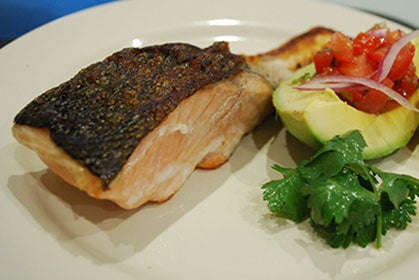Ask the Dietitian: Can a High-Protein Diet Cause Kidney Stones?

Eat the right proteins for muscle recovery—without toxins building up in your kidneys
Photo by Flickr user Alpha/Creative Commons 2.0.
My doctor recently discovered that I have only one kidney with a very small stone on it. His recommendation was, “Don’t eat too much protein.” What can I eat to replace the protein and help my muscles to recover? I am preparing to run a half marathon next month.
-Yesica Nieto, Brazil
The doctor’s advice to cut back on protein stems from the fact that some kidney stone formation occurs when urine is highly acidic. Red meat, poultry, some fish and shellfish produce uric acid when metabolized in the body. The body eliminates this acid via the urine, but a high concentration of uric acid in the urine can lead to the formation of a stone.
To keep your uric acid levels in check, limit the amount of protein in your diet that is derived from animals and seafood to one to two times a week. In order to fulfill your protein needs, focus on plant proteins like beans, nuts, seeds, nut butters, whole grains, tofu and tempeh, which have plenty of protein as well as essential vitamins and minerals that will help your body recover after your workout. Although these proteins are higher in carbohydrates, they are complex carbohydrates that do not cause a sharp spike in insulin release when they are metabolized because they are high in fiber. Eggs and salmon are also high-quality proteins that produce low levels of uric acid, and should be a staple in every runner’s diet due to their high levels of B vitamins, choline, phosphorus, iron and omega-3 fatty acids.
Foods that are rich sources of potassium are also recommended for kidney stone prevention, as potassium plays a vital role in enhancing the excretion of uric acid. Dark green leafy vegetables, yogurt, white beans, dried apricots, avocados and bananas are all good sources of potassium. It is also important to drink enough fluids to keep the urine diluted and flush away any toxins that might form stones. Aim for two to three liters of fluid a day.
This is an installment in our online Ask the Dietitian column with Maria Dalzot, MS, RD, CDN and an avid trail runner. You can visit her blog at www.mariadalzotrd.com and submit your nutrition questions to nutrition@trailrunnermag.com.
You might also like:
Want more stories like this?
{module Inside Dirt – footer}